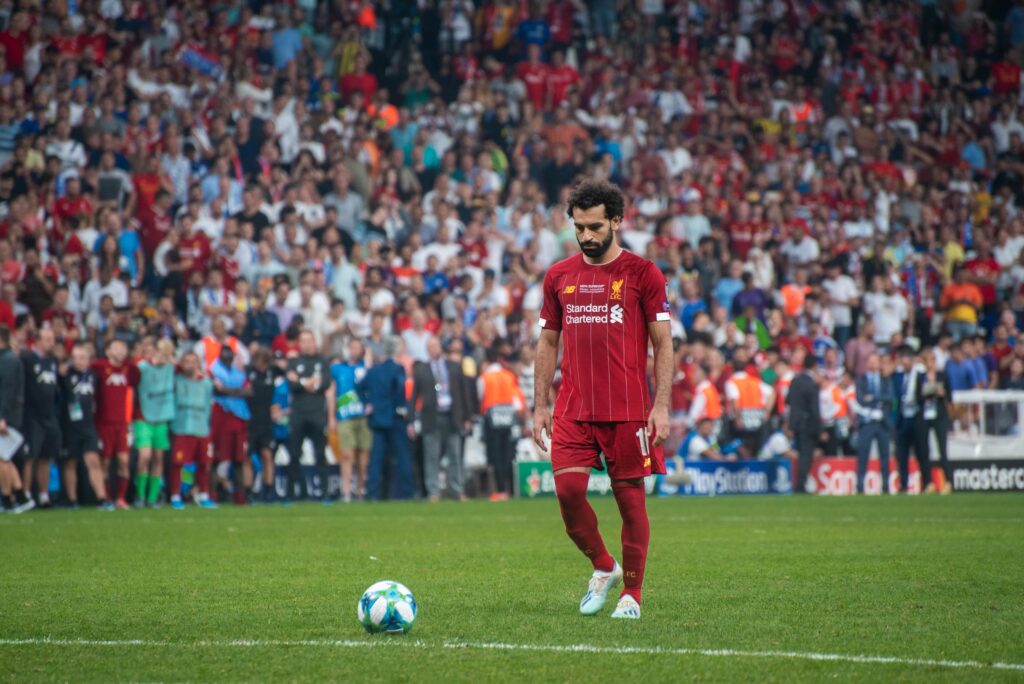Mohamed Salah’s lack of defensive work has become a small but growing issue for Liverpool, especially against stronger teams. Coach Arne Slot might have asked him to stay high up the pitch, waiting for quick transitions, which made him one of the most dangerous attackers in football. But the players behind him fail to cover properly, creating major defensive problems for whoever plays right-back this season.
Whether it’s Jeremie Frimpong, Conor Bradley, or Dominik Szoboszlai, they often face a 2v1 overload on their side. That weakness was clear on Saturday when Chelsea scored their winning goal. The worry now is that other top teams will copy this tactic and expose the same flaw.
Salah’s Freedom Comes with a Cost
It’s unlikely that Slot asks Salah to track back and help his right-back. If Salah had been told to follow Chelsea’s left-back Marc Cucurella, it was obvious he didn’t. Slot would never tolerate that level of neglect if it went against his plan.
Instead, he seems to give Salah full freedom to save his energy for attacks. That approach isn’t unique. Many teams use a similar strategy for their main forwards, allowing them to rest when out of possession. Yet there are still key moments when even attackers must help defensively.
Salah can do it. When Liverpool beat Manchester City last season, his defensive effort stood out as one of his best. So, if he’s staying up the pitch now, it must be because Slot instructed him to. The issue, therefore, lies in the system rather than in Salah’s attitude.
How Liverpool’s Structure Leaves Salah Exposed
Liverpool’s main issue isn’t Salah himself but how the team sets up behind him, especially against top opponents. The midfield and defensive players need to react faster when teams attack down the left.
Against Chelsea, it looked like the home side targeted that space deliberately. When Ryan Gravenberch or Alexis Mac Allister shifted too late to help, they left dangerous gaps in front of the defence. Those gaps allowed Chelsea to move the ball with ease and exploit the right flank.
This weakness matters less when Liverpool dominate possession, as they did in their title-winning season. But against elite teams, they must become tighter and more disciplined to avoid being punished again.
Losing Control and Composure
Salah’s role hasn’t changed, but his lack of goals has drawn more attention to his defensive side. His finishing slump makes every missed tracking run feel more significant. Still, his scoring form will return—he always finds a way back.
He got into several good positions against Chelsea, though his decision-making was off at key moments. The chances will keep coming, and so will the goals. The bigger concern lies in how Liverpool control matches. Compared to last season, their game management looks weaker.
The last week has been tough: three consecutive defeats in the Premier League and Champions League, combined with underwhelming performances. Of course, there are reasons—many new players joined, and several missed pre-season—but Slot’s side no longer feels as composed or structured as before.
Under Slot last season, Liverpool defended well and managed possession with precision. It was a clear improvement from the chaotic, high-energy style under Jürgen Klopp. Now, however, the team often looks disorganised.
The final half-hour against Chelsea felt like a cup tie—wild and unpredictable. Liverpool created chances but also allowed far too many, leading to their defeat.
How Slot Can Fix Liverpool’s Balance
Liverpool’s problems are not unsolvable. The team keeps giving the ball away cheaply, but that can change. The system itself doesn’t need to be reinvented. Instead, Liverpool must rediscover patience and composure in their build-up play.
The positive news is they sit only one point behind leaders Arsenal. There’s still time to correct mistakes and rebuild momentum. Physical sharpness will return as players like Alexander Isak, Mac Allister, Bradley, and Hugo Ekitike regain full fitness after incomplete pre-seasons.
Developing chemistry on the pitch also takes time—especially between the right-back and Salah, or between Florian Wirtz and Isak. These relationships will strengthen with matches.
There’s no need for panic. In this Premier League season, one bad week can look like a crisis, but every team faces such moments. Arsenal and Manchester City will likely experience the same challenges.
City’s title chances depend heavily on Erling Haaland’s hunger and fitness, while Arsenal look balanced and confident across the pitch, showing continuity from last season.
Liverpool, meanwhile, remain in transition. Slot’s rebuild still needs time and fine-tuning. But with small adjustments and growing understanding between players, the team is expected to improve as the season progresses.

